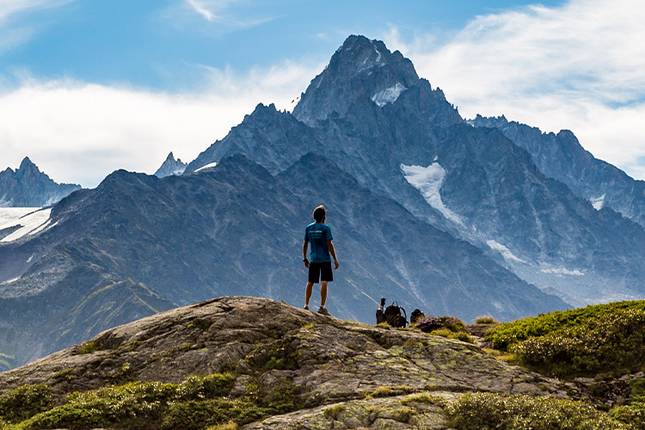
Requirements for Climbing Mont Blanc (Beginners and Experts)
Thinking about climbing Mont Blanc? This mountain isn't a walk in the park, but even aspiring mountaineers can scale its high altitude peak (with the right amount of planning and preparation, of course). From basic requirements to physical preparation and more, read on to learn what it takes to successfully climb Mont Blanc.
Mont Blanc temperatures
| JAN | FEB | MAR | APR | MAY | JUN | JUL | AUG | SEP | OCT | NOV | DEC | |
|---|---|---|---|---|---|---|---|---|---|---|---|---|
| Average °C | -3 | -7 | -3 | 5 | 8 | 14 | 16 | 15 | 13 | 8 | -1 | -6 |
| Average °F | 26 | 19 | 26 | 41 | 46 | 57 | 60 | 59 | 55 | 46 | 30 | 21 |
| High °C | -1 | -5 | -1 | 7 | 10 | 15 | 18 | 18 | 15 | 10 | 1 | -3 |
| High °F | 30 | 23 | 30 | 44 | 50 | 59 | 64 | 64 | 59 | 50 | 33 | 26 |
| Low °C | -6 | -11 | -7 | 1 | 5 | 9 | 12 | 10 | 7 | 2 | -5 | -9 |
| Low °F | 21 | 12 | 19 | 33 | 41 | 48 | 53 | 50 | 44 | 35 | 23 | 15 |
How to climb Mont Blanc
How do I prepare for Mont Blanc?
Successfully reaching the summit of Mont Blanc requires a high degree of preparation in both your route planning as well as your fitness levels. This is not a mountain which can be climbed on a whim, especially if you lack climbing and hiking experience.
When is the best time to climb Mont Blanc?
The best time to climb Mont Blanc is during the summer months. June to September is the safest time to climb, but if you want fewer crowds and you’ve got an impressive climbing resume, spring or fall is also an option. Learn more.
What permits do I need?
Despite recent environmental concerns, as well as worries about popular routes facing overcrowding, there is currently no official permit required to climb Mont Blanc. Learn more.
Do I need a guide to climb?
Mont Blanc is the most dangerous mountain in the region and, as such, a guide is strongly recommended - but not required. It’s strongly suggested that first-timers and inexperienced alpine hikers hire a guide.
How do I get to Mont Blanc?
Mont Blanc is actually quite accessible, as it can be reached via road, rail, or air. Fly into Geneva, Lyon, or Haute-Savoie Mont Blanc Airport with Geneva providing closest access (just under 90km away). Otherwise, drive to Chamonix, or catch a train from London. Learn more.
What should I pack/what equipment do I need?
Mont Blanc is one of the world’s tallest mountains and, as such, you’re going to need to bring an array of gear to enable a successful climb. You’ll need an ice axe, helmet, crampons, trekking poles, gaiters, as well as the appropriate clothing to reach the summit. Learn more.
Mont Blanc routes
- Gouter Hut Route. Distance: 4000 m, average duration: 2-3 days, success rate: 65-75%
- Grand Mulets Route. Distance: 3000 m, average duration: 2-3 days, success rate: 70%
- Cosmiques Route. Distance: 3500 m, average duration: 2-3 days, success rate: 60-75%
- Haute Route. Distance: 180 km, average duration: 12-14 days
- Tour du Mont Blanc (Mont Blanc Circuit). Distance: 170 km, average duration: 11 days, success rate: 100%










